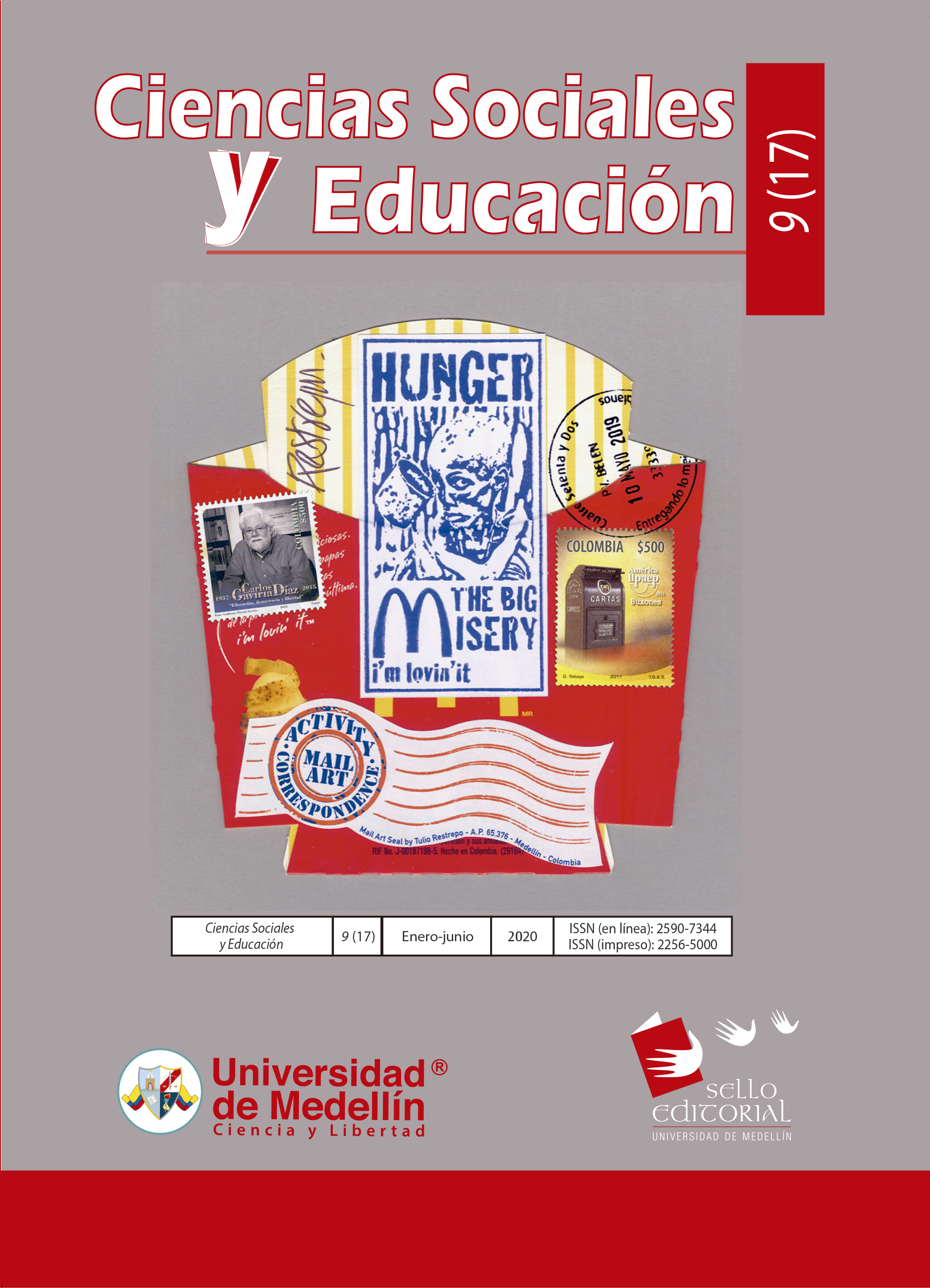The Teaching Bodies in the Philosophy Classroom
Main Article Content
Abstract
The following texts correspond to the main findings from research performed through an ethnographic approach to five professoriate students in Philosophy* from the Artigas Professors Institute (IPA in Spanish) in the city of Montevideo, Uruguay. It is framed within the field of didactics in philosophy, in which two fields of knowledge are articulated: studies on the body (fundamentally from philosophy and anthropology of the body) and the production around the teaching of philosophy. The fieldwork was performed between 2013 and 2014, the information processing was performed during 2015 and was publicly defended in 2016. The research was performed as a case study from a qualitative approach of ethnographic and interpretivist type. The relevance of the research itself is given by the need to embody the corporeal realm in teachers’ education and specifically in philosophy teachers formation. The corporeal realm is understood as a constitutive aspect of subjectivity and, thus, of the way of existing and presenting of the subjects in the world.
The goal of the research, even if it is framed as an exploratory study for not having a direct background on the field to inquire, refers to the need for integrating the work of the teaching object with himself, with its corporeality as an affective and affected body in the framework of the philosophical classroom.
_______________________________________
* This formation refers to an undergraduate formation which title is Medium Education Teacher with a Philosophy specialty, issued by the Uruguayan Educational Formation Council, Public Education National Administration. The formation here refers to training teachers for working, fundamentally, in medium school, which in Uruguay is commonly referred to as lyceum.
Article Details
References
Álvarez, E. (2010). Tras la exploración de lo cualitativo y singular, fenomenología, hermenéutica y más allá. En J. Rasner (coord.), De la epistemología a la metodología y viceversa: Una aproximación a la investigación en ciencias humanas y sociales (pp. 69-138). Unidad Central de Educación Permanente de la Universidad de la República de Uruguay.
Berttolini, M. (2009). La educación filosófica para la reconstrucción de las subjetividades. https://docs.google.com/viewer?a=v&pid=sites&srcid=ZGVmYXVsdGRvbWFpbnxkaWRhY3RpY2FmaWxvc
29maWNhfGd4OjQ5MjE4NTEzOTA4OGVlMmI
Butler, J. (1990). Actos performativos y constitución del género: Un ensayo sobre fenomenología y teoría feminista. En S. Ellen Case (ed.), Performing Feminisms: Feminist Critical Theory and Theatre (pp. 270-282). Baltimore University Press.
Calmels, D. (2001). Espacio habitado en la vida cotidiana y la práctica psicomotriz. Novedades Educativas.
Calmels, D. (2013). Fugas: El fin del cuerpo en los comienzos del milenio. Biblos.
Citro, S. (2009). Cuerpos significantes: Travesías de una etnografía dialéctica. Biblos.
Citro, S. (2010). Cuerpos plurales: Antropología de y desde los cuerpos. Biblios.
Citro, S. (2012). Cuerpos en movimientos: Antropología de y desde las danzas. Biblos.
Foucault, M. (1979). Microfísica del poder. Las Ediciones de La Piqueta.
Foucault, M. (2003). El yo minimalista y otras conversaciones. La Marca.
Gallo, L. (2011). La educación corporal bajo la figura del acontecimiento. Revista Educación Física y deporte, 30(2), 505-513. https://revistas.udea.edu.co/index.php/educacionfisicaydeporte/article/
view/11310
Gallo, L. (2012). Las prácticas corporales en la educación corporal. Revista Brasileira de Ciências do Esporte, 34(4), 825-843. https://cev.org.br/biblioteca/praticas-corporais-educacao-corporal
Gallo, L. (2014). Expresiones de lo sensible: lecturas en clave pedagógica. Eduçâo e Pesquisa: Revista da Faculdade de Educaçâo da USP, 40(1), 197- 214. https://doi.org/10.1590/S1517-97022013005000027
Geertz, C. (2003). La interpretación de las culturas. Gedisa.
Gómez, M. (2009). El género en el cuerpo. Avá, 15, 289-306. http://www.ava.unam.edu.ar/images/15/pdf/ava15_15_gomez.pdf
Larrosa, J. (2000). Pedagogía profana: Estudios sobre lenguaje, subjetividad y formación. Novedades Educativas.
Larrosa, J. (2003). Entre las lenguas: Lenguaje y educación después de Babel. Laertes.
Larrosa, J. (2006). Sobre la experiencia. Aloma: Revista de Psicología, Ciències de l’Educació i de l’Esport, 19, 87-112.
Levinas, E. (2002). Totalidad e infinito. Sígueme.
Masschelein, J. (2006). Educar la mirada. La necesidad de una pedagogía pobre. En l. Dussel y D. Gutiérrez (comps.), Educar la mirada. Políticas y pedagogías de la imagen (pp. 295-304). Manantial,
Flacso, Osde.
Merleau-Ponty, M. (1975). Fenomenología de la percepción. Gallimard.
Merleau-Ponty, M. (2008). El mundo de la percepción. Fondo de Cultura Económica.
Mora, A. S. (2010). Entre las zapatillas de punta y los pies descalzos. Incorporación, experiencia corporizada y agencia en el aprendizaje de danza clásica y contemporánea. En S. Citro (coord.), Cuerpos plurales. Antropología de y desde los cuerpos (pp. 219 238). Biblos.
Morin, E. (2001). Introducción al pensamiento complejo. Gedisa.
Nietzsche, F. (1990). La gaya ciencia. Yericó. Madrid España Pichón, E. (1999). El proceso grupal: del psicoanálisis a la psicología social (1). Nueva Visión.
Simons, H. (2011). El estudio de caso: teoría y práctica. Ediciones Morata.
Souto, M. (1993). Hacia una didáctica de lo grupal. Miño y Dávila editores.
Stake, R. (1999). Investigación con estudio de casos. Ediciones Morata.
Tourn, J. (2016). Cuerpo y enseñanza de la filosofía [tesis de maestría, Instituto Universitario, Centro Latinoamericano de Economía Humana, Uruguay]. Recursos educativos, Uruguay Educa. https://
uruguayeduca.anep.edu.uy/sites/default/files/2018-04/Janett%20Tourn%20Maestr%C3%ADa%20en%20Ense%C3%B1anza%20Media%20.pdf
Tozzi, M. M. (1999). Pensar por sí mismo. Introducción a la pedagogía de la filosofía. Popular.
Universidad de Antioquía. (s.f.). Grupos de investigación. Consultado el 28 de septiembre de 2019. http://www.udea.edu.co/wps/portal/udea/web/inicio/institucional/unidades-academicas/institutos/educacion-fisica-deportes/investigacion
Valles, M. (1999). Técnicas cualitativas de investigación social: Reflexión metodológica y práctica profesional. Síntesis.
Wandelfels, B. (2004). Habitar corporalmente en el espacio. Daimon Revista Internacional de Filosofía, 32, 21-37. http://revistas.um.es/daimon/article/download/15221/14681





